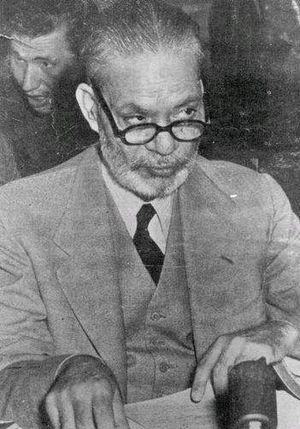Difference between revisions of "Zafrulla Khan"
(Improved: death_date.) |
(unstub) |
||
| Line 4: | Line 4: | ||
|image=Zafrulla Khan.jpg | |image=Zafrulla Khan.jpg | ||
|nationality=Pakistan | |nationality=Pakistan | ||
| + | |religion=Ahmadiyya | ||
|description=Proponent of Pakistan, Bilderberger | |description=Proponent of Pakistan, Bilderberger | ||
| − | |birth_date=1893 | + | |birth_date=6 February 1893= |
|birth_place=Sialkot, Punjab, British Raj | |birth_place=Sialkot, Punjab, British Raj | ||
|death_date=1 September 1985 | |death_date=1 September 1985 | ||
|death_place=Lahore, Punjab, Pakistan | |death_place=Lahore, Punjab, Pakistan | ||
| − | |constitutes= | + | |constitutes=lawyer,diplomat |
|alma_mater=Government College University, Lahore, King's College London | |alma_mater=Government College University, Lahore, King's College London | ||
|political_parties=All-India Muslim League, Muslim League | |political_parties=All-India Muslim League, Muslim League | ||
| Line 19: | Line 20: | ||
}} | }} | ||
'''Zafrulla Khan''' became one of the most vocal proponents of [[Pakistan]] and led the case for the separate nation in the [[Radcliffe Commission]] which drew the countries of modern-day [[South Asia]]. | '''Zafrulla Khan''' became one of the most vocal proponents of [[Pakistan]] and led the case for the separate nation in the [[Radcliffe Commission]] which drew the countries of modern-day [[South Asia]]. | ||
| + | |||
| + | ==Education== | ||
| + | He studied law at [[King's College London]] (1911-1914).<ref>http://www.alislam.org/library/zafar1.html</ref> | ||
| + | |||
| + | ==Career== | ||
| + | He was professor at the [[Law College in Lahore]] (1919-1924). He was elected as a member of the [[Punjab]] Legislative Council in [[1926]. He participated in the "Round Table Conferences" that preceded the independence of [[India]] in the years 1930 to 1932. From 1935 to 1941 he was a member of the Executive Council of the British Viceroy (in the ministerial rank). | ||
| + | |||
| + | Sir Muhammad Zafrullah Khan represented India at the [[League of Nations]] in 1939. From September 1941 to 1947 – until the partition of the Indian subcontinent – he was a judge of the [[Supreme Court of India]]. In July [[1947]], shortly before [[the partition of India]], he presented the position of the [[Muslim League]] in favor of [[Pakistan]] to the "Radcliffe Boundary Commission" and advocated a just demarcation of the border.<ref name=weebly>https://zafrullahkhan.weebly.com</ref> | ||
| + | |||
| + | From December 1947, Khan represented Pakistan at the [[United Nations]]. Together with [[Muhammad Ali Jinnah]], he was one of the founding fathers of this new state. From 1947 he was the first Foreign Minister of Pakistan for seven years until his election to the [[International Court of Justice]] in [[The Hague]]. From [[1958]] to[[ 1961]] he was vice-president and from [[1970]] to [[1973]] president of the International Court of Justice, where he also sat as an ad hoc judge in three cases. In 1962/63 he was President of the [[UN General Assembly]].<ref name=weebly/> | ||
| + | |||
| + | |||
{{SMWDocs}} | {{SMWDocs}} | ||
==References== | ==References== | ||
{{reflist}} | {{reflist}} | ||
| − | |||
Latest revision as of 11:17, 28 December 2024
(lawyer, diplomat) | |
|---|---|
 | |
| Born | 6 February 1893= Sialkot, Punjab, British Raj |
| Died | 1 September 1985 (Age 92) Lahore, Punjab, Pakistan |
| Nationality | Pakistan |
| Alma mater | Government College University, Lahore, King's College London |
| Religion | Ahmadiyya |
| Party | All-India Muslim League, Muslim League |
Zafrulla Khan became one of the most vocal proponents of Pakistan and led the case for the separate nation in the Radcliffe Commission which drew the countries of modern-day South Asia.
Education
He studied law at King's College London (1911-1914).[1]
Career
He was professor at the Law College in Lahore (1919-1924). He was elected as a member of the Punjab Legislative Council in [[1926]. He participated in the "Round Table Conferences" that preceded the independence of India in the years 1930 to 1932. From 1935 to 1941 he was a member of the Executive Council of the British Viceroy (in the ministerial rank).
Sir Muhammad Zafrullah Khan represented India at the League of Nations in 1939. From September 1941 to 1947 – until the partition of the Indian subcontinent – he was a judge of the Supreme Court of India. In July 1947, shortly before the partition of India, he presented the position of the Muslim League in favor of Pakistan to the "Radcliffe Boundary Commission" and advocated a just demarcation of the border.[2]
From December 1947, Khan represented Pakistan at the United Nations. Together with Muhammad Ali Jinnah, he was one of the founding fathers of this new state. From 1947 he was the first Foreign Minister of Pakistan for seven years until his election to the International Court of Justice in The Hague. From 1958 to1961 he was vice-president and from 1970 to 1973 president of the International Court of Justice, where he also sat as an ad hoc judge in three cases. In 1962/63 he was President of the UN General Assembly.[2]
Events Participated in
| Event | Start | End | Location(s) | Description |
|---|---|---|---|---|
| Bilderberg/1955 September | 23 September 1955 | 25 September 1955 | Germany Bavaria Garmisch-Partenkirchen | The third Bilderberg, in West Germany. The subject of a report by Der Spiegel which inspired a heavy blackout of subsequent meetings. |
| Bilderberg/1956 | 11 May 1956 | 13 May 1956 | Denmark Fredensborg | The 4th Bilderberg meeting, with 147 guests, in contrast to the generally smaller meetings of the 1950s. Has two Bilderberg meetings in the years before and after |